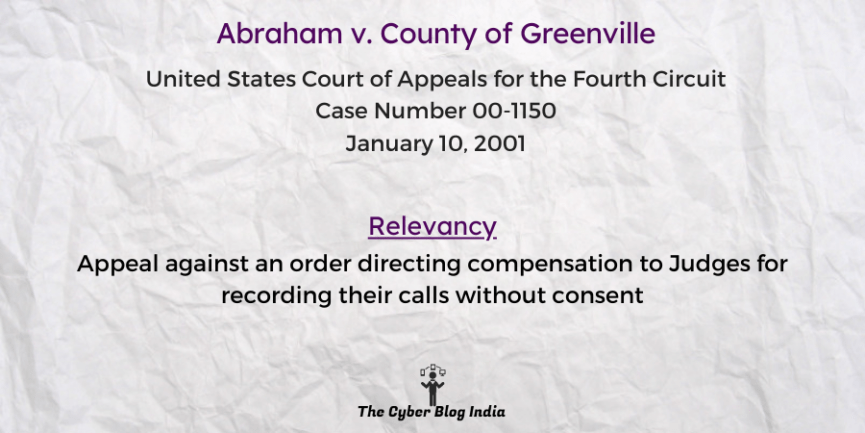Abraham v. Country of Greenville

Abraham v. County of Greenville
237 F.3d 386
In the United States Court of Appeals for the Fourth Circuit
Case Number 00-1150
Before Chief Judge Wilkinson, Circuit Judge Wilkins, and Circuit Judge Motz
Decided on January 10, 2001
Relevancy of the Case: Appeal against an order directing compensation to Judges for recording their calls without consent
Statutes and Provisions Involved
- The Omnibus Crime Control and Safe Streets Act, 18 U.S.C. §§ 2510 et seq.
Relevant Facts of the Case
- Greenville County constructed a new detention centre and courtroom facilities for city and county judges called the Judicial Corridor.
- The county installed recording systems in the detention centre. This system recorded incoming and outgoing calls 24/7, except for calls from attorneys.
- A recording system was installed for administrative staff and jail guards. All the staff was made to sign a consent form. But it also recorded the calls from the Judicial Corridor without informing them.
- The county installed a new recording system at the detention centre. This new system continued to record all calls from the Judicial Corridor.
- In August 1998, Judge Michael B. Abraham suspected that his calls were being wiretapped and found it true after confirming it with the Jail Administrator.
- Abraham and several other judges filed a suit against Greenville County for violations of the Federal Wiretapping laws.
- The District Court ruled in the Judges’ favour with damages as compensation. The county has filed an appeal against the impugned order.
Prominent Arguments by the Counsels
- The appellant’s counsel argued that the law enforcement agencies come under the exceptions given in the statute.
- The plaintiff’s counsel contended that this exception is not applicable. Monitoring judges is not the ordinary course of county law enforcement agencies.
Opinion of the Bench
- The purpose behind statutory damages is to compensate the judges for an intangible loss such as invasion of privacy, shock, and humiliation. Moreover, such damages also deter the defendants from engaging in activities that invade the privacy of individuals.
Final Decision
- The court dismissed the appeal.
